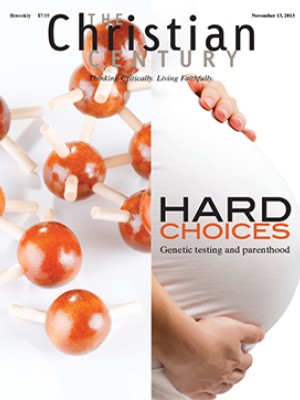How to disagree
Civility was the theme of an event sponsored by the Presbyterian Church (U.S.A.) Synod of the Rockies in mid-October. The theme was well timed in light of congressional gridlock, with legislators refusing to talk to one another, and also for a Protestant denomination that has been arguing for decades over issues of sexual practice and orientation, ordination, biblical authority and theology. The arguments have not always been civil.
When the church’s General Assembly in 2011 removed a rule that prohibited the ordination of gays and lesbians, conservatives strongly dissented. More than a hundred congregations, including some of the largest in the denomination, have left. One congregation has sued its presbytery and obtained an injunction that prohibits presbytery officials from interfering in the life of the church. The topic of civility and remaining in relationship in spite of significant disagreement and conflict could not be more relevant.
Read our latest issue or browse back issues.
Event planners invited Richard Mouw and me to make presentations. Mouw, who recently retired as president of Fuller Theological Seminary, is a distinguished scholar and popular spokesman for the evangelicals in the PCUSA. His positions on the defining issues are consistently conservative, but he is a loyal Presbyterian and consummately civil. He began his remarks with a review of John Calvin’s writings on the topic of civility. Calvin, he observed, could be intolerant and harsh. His involvement in the execution of Michael Servetus is no secret. But Calvin also taught respect, tolerance and civility among Christians engaged in theological disputations.
I suggested that some incivility in the church reflects the rudeness and decline in civility in American culture. I also suggested that Christians owe one another more than basic civility because we operate under the mandate to love one another with enough visible authenticity that the world will understand, and be attracted to, the faith we profess. I said that Presbyterians, perhaps more than any other Protestant denomination, have a regrettable history of resolving internal conflicts by walking away from one another and forming a new denomination.
In the final session, Mouw and I had a conversation using Leonard Swidler’s “Dialogue Decalogue”—ten guidelines for engaging in constructive conversation with someone with whom one differs. Mouw spoke about Charles Hodge, a 19th-century Reformed theologian and fierce opponent of theological liberalism. Hodge found the theology of Friedrich Schleiermacher so wrong and distasteful that he wrote 15 pages rigorously critiquing Schleiermacher’s ideas. Yet in a footnote at the end of Hodge’s critique, he noted that it was Schleiermacher’s personal practice to gather his children around the family piano after dinner to “sing praises to the Lord Jesus.” Hodge said he was confident that Schleiermacher, who died shortly before Hodge’s critique was published, “was now singing praises to the Lord Jesus face to face.”
I have been an active advocate on the liberal side of most of the critical and divisive issues the church has faced in the last 50 years—on race, the role of women, poverty, sexual orientation, the environment. I am no stranger to strong debate, criticism and incivility. So I was deeply touched by hearing how Charles Hodge maintained a respectful and civil relationship with a man with whom he could not have disagreed more. I was also touched by Richard Mouw’s kindness and civility. It gave me hope for my church.
The experience also made me newly impatient with our less than civil, less than loving ways of disagreeing. What the world sees of the ways that Christians disagree is far from impressive—and is sometimes repulsive. It must make Jesus weep.






